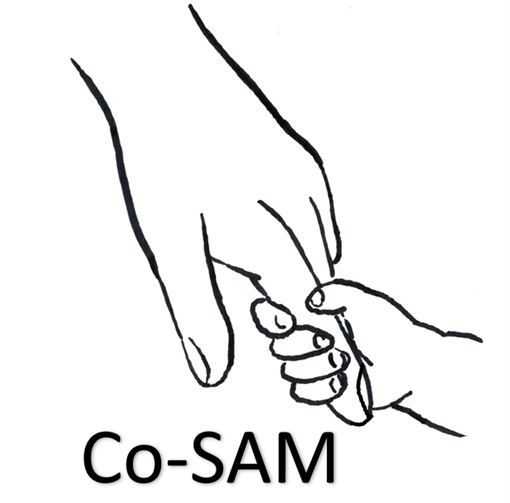What is Co-SAM?
Co-SAM is a research study with a focus on finding better treatments for children who have been hospitalised with severe acute malnutrition (SAM) and another existing health concern, such as HIV or cerebral palsy. It is taking place in 9 sites across Zimbabwe, Zambia and Kenya. It is a randomised clinical trial, meaning that participants may be assigned to one of 5 treatment arms.
A clinical trial is a type of research that studies new treatments and their effect on health outcomes. There are many stages of reviews and approvals before anyone can take part, in order to protect the participants’ wellbeing.
What is the goal?
Severe Acute Malnutrition (SAM) is a serious health problem in children, particularly in Sub-Saharan Africa. Some children are admitted to hospital for treatment, but continue to be at an increased risk of dying after leaving hospital, being readmitted to hospital or not gaining weight well. We are investigating new treatment plans to help them recover better.
If results are promising, then we will have evidence to support changes to current treatment guidelines. The researchers have experience of working with policy makers in Zimbabwe, Zambia and Kenya.
What does participation involve
All children involved in the study will receive the usual treatment available for SAM and some will receive extra treatments to see whether there is a difference in how they recover once they leave hospital.
The study will enrol a maximum of 1266 children aged 6 months to 5 years across three countries: Zambia, Kenya and Zimbabwe. Caregivers of children admitted to hospital with SAM will be invited to allow their child to take part. Participation is entirely optional, and caregivers will be given plenty of information and time to ask questions and consult family members or friends.
We start the interventions while the child is in hospital and continue them for 12 weeks after discharge. Study visits take place in the study clinic after 2 weeks, 4 weeks, 6 weeks, 8 weeks, 12 weeks, and 24 weeks. At these visits we will measure weight, height, and upper arm size, to see how the treatment is working, and collect medical information about the child. We will collect blood and stool samples. The length of time that a child will be in the study is 24 weeks in total, i.e., 6 months.
What happens to the data collected?
The researchers will write scientific papers in order to share results from the trial with the wider community. They may also present findings at conferences or other events, and there may be media interest in this study. At no point will any personal or identifiable information about a specific participant be shared publicly.
What are the treatments?
Children will be randomly assigned by a computer, like the flip of a coin, to one of the treatment options described here:
All children int the study will receive, at a minimum, the best care according to existing guidelines in their country. Children assigned to arms 2 to 5 will receive extra treatments, which may or may not further aid recovery.
1. Current treatment
The participant is treated in line with current guidelines only. This is to compare the new interventions to the existing guidelines, so that we can determine if they really make a difference.
2. Extra antibiotics to prevent infections
These will be antibiotics that are already available in-country and are known to be generally safe for children, but are not routinely given following hospital discharge.
3. A different type of Ready-to-use-therapeutic-food
We know that Plumpy’nut or similar therapeutic feeds work very well. We have collaborated with Nutriset to create a potentially improved formula, specifically for this group of children.
4. Child play and extra caregiver support
We have designed a programme focused around child play and caregiver support based on evidence that this improves recovery.
5. All the 3 interventions together.
This may have the biggest impact, or we may find that just one of the treatments alone is more effective.
